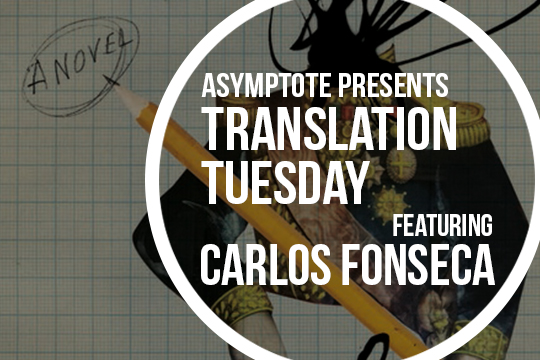Today we present an extract from Carlos Fonseca’s dazzling debut about the demented final project of a brilliant mathematician. Recalling the best of Bolaño, Borges, and Calvino, Colonel Lágrimas is an allegory of our hyperinformed age and of the clash between European and Latin American history.
The colonel aspires to have a thousand faces. The file endeavors to give him only one. Now that he’s sleeping we can remove the folder from the cabinet where it is stored, remove the blue band that protects the file, and thumb through it at our leisure, study the case history hidden behind this tired man’s dreams. On the first page in this heavy, grayish folder, we find the fundamentals of an identity: a name, date of birth, and place of origin. Strange inflexibility for a man who dedicated his life to being many, to seeking happiness through a schizophrenic multiplicity of personalities. The colonel inhabits his century with the anonymity of a fish in water. And, nonetheless, a name and a date bring continuity to the archive. Clearly, the sleeping man is only one. We are left with the magic of perspective, looking at him from a thousand different angles, drawing a kind of cubist portrait of this tired man. At times, asleep though he is, it would seem that the colonel is posing for us: he turns to one side, he turns to the other, he changes positions as often as he changes dreams. We tell ourselves that we must look at the file with the flexible gaze of one who catalogues dreams, we must analyze the colonel’s masks from the elusive position of happiness.
***
In the midst of war, the weight of his heritage upon him, the little colonel learned to play with his masks. We find in the file, in almost indecipherable handwriting, a note that establishes the precise moment of what would be one of the great realizations of his life: to don a mask was to refuse a destiny. Dated in 1943 and signed by a certain Jacques Truffaut, psychoanalyst at a Parisian orphanage, the note is summarized in the following lines: “The boy refuses to answer in his mother tongue. He rejects Russian with an alarming rage. He seems to want to annul his origins. On the other hand, he caresses Spanish with an angelic fluency.” Truffaut knows little of those rainy Chalco afternoons. For him, Mexico calls up ideas of erotic barbarism, of adventure and expeditions with no return, and so, in an attempt to feel at home, he chooses to write, on the line for birthplace, the French name, Mexique. But the little colonel doesn’t like homes: he prefers a theory he discovers in a French copy of National Geographic, in an article about the tribal use of masks in northeastern Africa. He prefers to think that civilization originated with the simulacrum, feigned identity, anonymity with a face, endless flux. He thumbs anxiously, happily, through the article that tells of a certain Johann Kaspar Lavater, father of physiognomy, who thought he had discovered the moral outlines of personalities in people’s faces. The colonel sketches precise and fantastic drawings in which different faces are juxtaposed with animal physiognomies: a man with a pointed snout compared to a long-nosed dog, a man with a small nose beside a buffalo. He laughs in the midst of war, and his laughter is the first of many masks. Years later, the colonel will find in his love of butterflies a kind of final mask, a homeopathic remedy for this, his solitude of grand, dramatic laughter.

